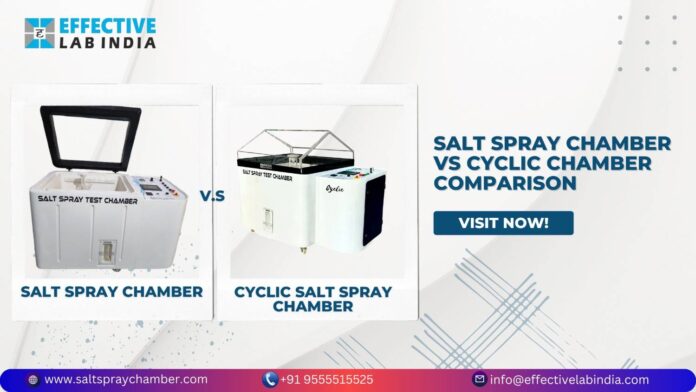The argument between salt spray chambers and cyclic salt spray chambers is continuing strongly in the field of corrosion testing. In sectors where product durability and resilience to environmental variables are essential, such as manufacturing, automotive, and aerospace, both are indispensable instruments. To ensure you choose the best option for your testing requirements, this article offers a thorough comparison to help you comprehend their distinctions, uses, and advantages.
What is a Salt Spray Chamber?
A salt spray chamber, also known as a salt spray test chamber, is a standardized laboratory testing instrument for testing the corrosion resistance of a material under controlled conditions. By spraying test samples with a salt solution, simulating an extreme case to evaluate the durability of the product.
Key Features of Salt Spray Chambers in 2025
- Corrosion Resistance Testing: These chambers are ideal for testing the corrosion resistance of coatings, paints, and metals.
- Standardized testing protocols: International standards such as ASTM B117, ISO 9227, JIS Z 2371, and others are followed.
- Cost-Effective Solution: The salt spray chamber price is generally affordable compared to other advanced testing methods.
- Enhanced Corrosion Simulation Accuracy: Advanced environmental sensors for precise monitoring of temperature, humidity, and airflow.
- Advanced User Interface: Intuitive touchscreen interface with multilingual support for ease of operation.
Applications of Salt Spray Chambers
- Automotive Industry: Tests the corrosion resistance of automotive parts such as panels, nuts, bolts, and coatings under extreme conditions.
- Paints and Coatings: Assesses the protection of paints and coatings against environmental degradation.
- Aerospace Components: Ensures the durability of aircraft parts when in extremely humid and salty environments.
- Marine Equipment: Evaluates the saltwater corrosion resistance of materials and coatings used in marine environments.
- Electronics Industry: Tests the corrosion resistance of connectors, circuit boards, and enclosures under wet conditions.
- Construction Materials: Tests the long-term performance of structural steel and fasteners in corrosive environments.
What is a Cyclic Salt Spray Chamber?
While adding more sophisticated capabilities, a cyclic salt spray chamber expands upon the fundamentals of conventional salt spray chambers. These chambers may precisely mimic natural weathering by simulating a variety of environmental conditions, such as salt spray, drying, and humidity cycles.
Key Features of Cyclic Salt Spray Chambers in 2025
- Advanced Simulation: A Highly realistic analysis is provided by simulating multiple environmental conditions in a single test cycle.
- Customizable Cycles: Users can set up a test cycle to simulate a specific climate or climate.
- Enhanced Accuracy: These buildings provide more accurate results to predict long-term performance.
- Full standards compliance: Strict international standards such as ASTM G85 and ISO 12944 are adhered to.
- Enhanced Precision Control: Advanced microprocessor technology ensures precise control of temperature, humidity, and spray cycles.
Applications of Cyclic Salt Spray Chambers
- Automotive Industry: Durable testing of automotive parts such as body panels, fasteners, and coatings against salt and environmental factors.
- Marine Equipment: An examination of the corrosion resistance of ships, boats, and offshore equipment exposed to strong salt water.
- Aerospace Components: A realistic simulation of the weather conditions is used to ensure the longevity of aircraft components, including components and materials.
- Building and Construction Materials: Corrosion resistance testing of reinforcing steel, roofing, and metal cladding for industrial infrastructure projects.
- Consumer Electronics: To ensure the durability of electronic devices and accessories in varying humidity and salinity environments.
- Paints and Coatings: Studies on the effectiveness of finishes, powder coatings, and protective paints used in harsh weather conditions.
Salt Spray Chamber vs Cyclic Chamber: A Detailed Comparison
| Feature | Salt Spray Chamber | Cyclic Salt Spray Chamber |
| Testing Conditions | Saline spray only | Saline spray, humidity, drying cycles |
| Real-World Simulation | Limited | Highly realistic |
| Standards Compliance | ASTM B117, ISO 9227 | ASTM G85, ISO 12944 |
| Complexity | Simple and easy to operate | Advanced and programmable |
| Salt Spray Chamber Price | Generally more affordable | Higher cost due to advanced features |
| Applications | Basic corrosion testing | Advanced research and product validation |
Salt Spray Chamber Manufacturers in India
India has leading salt spray chamber manufacturers offering high-quality, reliable testing solutions. Some of the top companies provide custom chambers that meet specific industrial needs. The salt spray chamber price in India varies depending on the component’s features, sizes, and brands, but competitive pricing ensures a selection of services of different sizes.
Conclusion
Salt spray chambers and cyclic salt spray chambers play an important role in corrosion testing (salt fog test). The choice between the two options depends on your testing needs, budget, and the complexity of the simulation you need. While salt spray chambers are suitable for basic salinity tests, cyclic salt spray chambers are necessary for advanced, realistic testing conditions.















